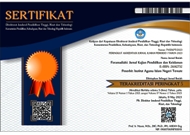Upaya Guru Fiqih Dalam Meningkatkan Hasil Belajar Siswa Di Mts Al-Khairaat Falabisahaya
Abstract
Full Text:
PDFReferences
Abdul Mujib, Jusuf Mudzakkir. (2016). Ilmu Pendidikan Islam. Jakarta: Kencana. Kanuka, H. (2005). An exploration into facilitating higher levels of learning in a text- based Internet learning environment using diverse instructional strategies. Journal of Computer-Mediated Communication, 10(3), 1-15.
Mulyasa. (2014) Guru Dalam Implementasi Kurikulum 2013. Bandung: PT. Remaja Rosdakarya Offset.
Nana sudjana, Ahmad Rivai. (2014) Pedoman Praktis Mengajar. Bandung: Dermaga.
Roestiyah, N. K. (2010) Masalah Pengajaran Sebagai Suatu Sistem. Jakarta: Bina Aksara.
Sa’dullah, Anwar. (2012) “Membangun Pendidikan Islam (Upaya Humanisasi Aqidah Melalui Jalur Formal). http: //e-journal.staima alhikam.ac.id/talimuna.
Slameto. (2013) Belajar Dan Faktor-Faktor Yang Mempengaruhinya. Jakarta. Rineka%0ACipta.%0A%0A.
Usman, Moh. Uzer. (2012) Menjadi Guru Profesional. Bandung: Remaja Rosdakarya
Zulkifli Hasan. (2022). “Mengapa Pendidik Dalam Islam Disebut Murabbi Muallim Dan Muaddib.” APACODE. https://apacode.com/mengapa-pendidik-dalam-islam- disebut-murabbi-muallim-dan-muaddib (diunduh pada tanggal 28 Okt 2022).
DOI: http://dx.doi.org/10.46339/foramadiahi.v14i2.930
Refbacks
- There are currently no refbacks.
Copyright (c) 1969 Iskandar Asri

This work is licensed under a Creative Commons Attribution-NonCommercial-ShareAlike 4.0 International License.


